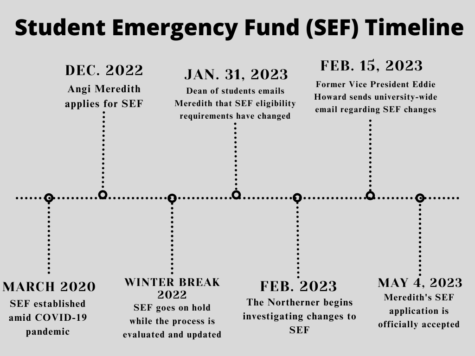Student Emergency Fund leaves student in five-month holdup
June 20, 2023
NKU’s Student Emergency Fund has undergone extensive changes over the past academic year, resulting in some confusion and frustration on the part of students who have applied.
Angi Meredith, a non-traditional student, waited nearly five months to receive the emergency funds she applied for in December 2022. The Northerner explored Meredith’s experience and the changes implicated on the Student Emergency Fund below.
What is the Student Emergency Fund?
The Student Emergency Fund (SEF) was adopted in March 2020, amid the surge of the COVID-19 pandemic. At that time, the university had received federal money to provide for students in need of emergency relief. As the months went on, the university began accepting contributions from donors to supplement the fund.
The fund is intended to provide emergency relief for costs that disrupt student learning, such as emergency medical care, medications, food, travel, deaths in the family and more, according to the online application form. Approved applicants may receive up to $400, the application says.
There are certain eligibility requirements for a student to receive the funds. In an August 2022 email obtained by The Northerner, the criteria included being an enrolled student, in good academic standing, providing documentation of the hardship and documenting that SEF was only a part of the resources being considered to resolve the financial hardship.
When the fund was created, the goal was simple, Vice President for University Advancement Eric Gentry said—to assist students as quickly as the university could. From the birth of the fund through the end of the fall 2022 semester, funds were disbursed through direct deposit or paper checks sent to students.
At the end of the fall semester, however, the process turned on its head.
Changes to SEF

Throughout the 2022-2023 winter break, no student emergency fund requests were reviewed, according to Dr. Bob Alston, Dean of Students. He said this was because the process was being evaluated and updated.
In January 2023, according to an email obtained by The Northerner, the new criteria stated that a student applicant for SEF must:
- “Be enrolled at least ½ time during the semester in which they apply (undergraduate, graduate)
- Be in good academic standing
- Have no outstanding NKU balance(s)
- Have availability for additional financial aid
- Share information about financial hardship related to the disruption of your NKU education (including an itemized list of costs you plan to cover, including documentation to support your request)”
In February, it became known that the criteria had been updated. All previous terms of eligibility were still in effect; however, criteria changed from having “no outstanding NKU balance(s)” to having “no unmanaged NKU balance(s).”
An unmanaged balance, according to Assistant Vice President for Enrollment and Financial Assistance Leah Stewart, means there is an outstanding balance on a student’s NKU account that is not being covered by a payment plan.
Additionally, SEF would no longer be a check or direct deposit cut to the students; the funds would be processed through the Office of Financial Aid.
NKU’s website regarding the emergency fund does not presently include these new criteria.
There were mixed messages about what would happen if a student applicant had an unmanaged tuition and fees balance. While Alston said that SEF would not be applied to a student’s unmanaged NKU balance, Stewart said that if a student had an unmanaged balance, the funds would be applied to their NKU account.
“If [the student account] is unmanaged, and that means that they’re not meeting the terms of the payment installment plan, then whatever money that they would get, it would hit their account,” Stewart said. “One of the benefits is that then the student doesn’t have to worry necessarily about their NKU unmanaged account because the money is hitting their account… while they use their other resources to do with what’s needed.”
Alston said the original donor goal was specifically not to use the funds for tuition and fee payments.
Donors who give explicitly to the Student Emergency Fund are not typically made aware of how the funds are processed or where they might go, Gentry said. When donating online, donors are shown that the funds will be collected for unforeseen circumstances, not tuition or fees, according to its website.
Stewart said that when processing SEF through financial aid, the request is expedited, but she was unable to provide a timeline of how many days it should take for a student to receive it.
Alston said the decision to update the requirements and processing of the fund was made by former Vice President for Student Affairs and Enrollment Management Dr. Eddie Howard, Leah Stewart, members of the NKU Foundation and himself. Alston said SEF changed due to the “tightening of post-COVID guidance from the Department of Education.”
When students were directly receiving checks without being processed by the Office of Financial Aid, Stewart said, the received funds were not being accounted for in their aid package. Stewart said because things were happening and changing so quickly surrounding the COVID-19 pandemic, the office did not realign the practice until “coming out of COVID and reviewing some of our practices.”
Stewart also said that if a student is already receiving their maximum ‘cost of attendance’ financial aid, they would not be able to receive the emergency fund. Cost of attendance aid refers to money provided by the federal government for direct costs–like tuition and housing–and indirect costs that do not show up on a student’s bill–like books and transportation.There could be changes made to the loan or aid amount the student receives if it would best benefit them, she added.
While the university’s budget deficit complicated things, Alston said, it did not directly impact the decision to update the process and eligibility of SEF.
Student experience
Angi Meredith, a mother and non-traditional student pursuing a Bachelor’s degree in social work, said she had a shady and ludicrous experience applying to the Student Emergency Fund.
In December, Meredith had an emergency surgery procedure coupled with a nearly $400 outstanding car payment. A professor advised her to apply for the Student Emergency Fund, as the faculty member felt her situation was exactly what the funds were intended for.
“When [the surgery] happened, I’m like, ‘Okay, there’s an emergency fund. Let me apply for that.’ That takes a little bit of stress off me at the time,” Meredith said.
The social work major applied for SEF in December. Winter break came and passed, and she heard nothing about her application. On Jan. 20, Meredith corresponded with staff members about her application. Julie Bridewell, coordinator for case management, stated in an email that applications were waiting to be reviewed while “changes were made by Dr. [Eddie] Howard.”
Howard declined to interview prior to his departure.
Over 10 days passed. On Jan. 31, Meredith received a notice from the dean of students via her personal email account alerting her that the criteria for SEF had changed, and her one-month-old application was still being considered. The dean also said that because Meredith had submitted her application before the changes were officially enacted, if she qualified for any funds, they would be disbursed to her directly. Lastly, the email included that if she would like to withdraw her application, she could call or email the office. SEF Email
“It’s a waiting game, like they want you to say, ‘Never mind I don’t want it,’” Meredith said.
February passed and Meredith never received any notification regarding the status of the application. March and April went the same way, and it was not until May 4 that she was notified her application for SEF was officially approved.
A five-month waiting period for what was meant to be an emergency fund left Meredith less than satisfied.
“That money is allocated just for that…” she said. “So I’m unclear on why it would take so long. It’s like they want you to give up. Because in one of those emails, [Alston] did say if you would like to withdraw, you can do that.”
Provost Matt Cecil responded to Meredith’s situation, saying in a university statement, “We have reviewed Angi Meredith’s request for student emergency funds and found we made a mistake. We try hard to make sure every student’s request is addressed in a timely manner. In Ms. Meredith’s case, a clerical error was made and it resulted in a significant delay to the approval of her emergency funds. We sincerely apologize for the hardships this caused Ms. Meredtih and will work to do better in the future.”
It is unclear what the clerical error included.
The experience has left Meredith with a poor taste for the university, saying she felt like no one cared about her problems or circumstances, especially as an older, non-traditional student. “I just want to be done with NKU,” she said.
Meredith sought to make it clear that even though extenuating circumstances and financial troubles happen, it doesn’t make someone any less of a person, and she doesn’t want other SEF applicants to feel the same way she did.
“This kind of game really does a number on you. It makes me feel like I’m kind of in it on my own,” Meredith said.

